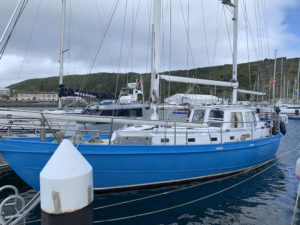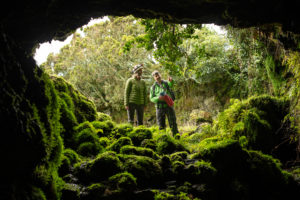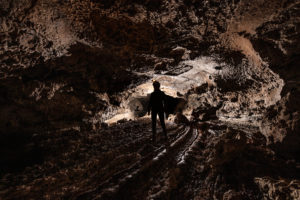Arnaud (38) and Basia (36)
Interview conducted in Praia da Vitória, Terceira, Azores
As a rare late season tropical storm (Sebastian) approaches the Azores, sailors in port have been busy preparing their boats. We moved the R heritage Too to a well protected winter berth and Arnaud and Basia were taking down their sails for winter storage. After boat chores were done, we went out for coffee. Children in the square of the lush green island were pushing around polar bears and penguins in a fake ice rink. The music of Bob Marley played in the air. The conversation turned the right of access to music, education and fake ice rinks. Like everything, Globalization is neither black or white but some shade of grey. I had been spending a lot of time with this interesting couple, attending free Fado concerts in town, learning about systems on their sailboat and enjoying Basia’s delicious cooking. I had previously eluded to “The Faces of Climate Change” and this evening seemed like the time to conduct and interview. Their words follow.
in a fake ice rink. The music of Bob Marley played in the air. The conversation turned the right of access to music, education and fake ice rinks. Like everything, Globalization is neither black or white but some shade of grey. I had been spending a lot of time with this interesting couple, attending free Fado concerts in town, learning about systems on their sailboat and enjoying Basia’s delicious cooking. I had previously eluded to “The Faces of Climate Change” and this evening seemed like the time to conduct and interview. Their words follow.
What is your favorite part of living in Switzerland?
It is beautiful and there are many opportunities. I (Basia) left Poland to seek a better quality of life. I found that in Switzerland. It is tidy and well organized.
What is your least favorite part of living in Switzerland?
Switzerland is a demanding society. There is pressure to fit into the organized culture. We come from an agricultural mentality and are hard workers. Swiss people appreciate focus and effort. There is an expectation that you will give 100% to everything you do.
Do you see the changes in the natural world where you live?
Yes, People in Switzerland have a close relationship to the mountains. Camping, skiing, spending time on lakes is a part of most Swiss peoples childhood. The glaciers and snow are visible as you travel around the country. In the last 20 years changes have been visible. The weather is not as predictable. Winters are not as snowy and are often late to come. Sometimes we get very big storms late in the season. There used to be meters of snow, now there is much less and the glaciers are much smaller.
In summer, storms are stronger than ever. This summer the heat was extraordinary. During the Golden Cup sailing race on Lac Leman (Lake of Geneva) a storm produced winds of 120 km/hour.
Do you think these changes are from man’s activities?
The planet has always seen massive climate changes but the accelerated rate is a consequence of the industrial age. The earth has survived climate cycles in the past. We have a human centered vision of the earth. We worry about ourselves but the earth will survive. If we go extinct quickly, the earth has a better chance of recovering rapidly.
How do you think these changes will impact Switzerland?
The weather changing is a big economic issue for Switzerland. Much of the winter economy of many small valley communities is dependent tourists visiting ski areas. This impacts everybody from in the community, people who own hotels, small market owners and everybody who works there.
As the glaciers melt there are more land slides. It is costly to repair the infrastructure damaged by these. The snow in Switzerland is the major source of water for the Rhône and Rhine rivers. These two rivers provide drinking water to much of Europe and Europeans worry about where there water for drinking and growing crops will come from in the future.
Can you give me an example of something you are doing to reduce your impact on the planet?
(Basia) I am a vegetarian. This started as I was a child growing up on a farm in Poland. My family raised animals for food, but when I was young I saw animals as equal to humans so I started not eating meat. I also try and eat local organic food, but it is hard. I try and eat seasonally as much as possible. I think this is an important part of the solution but eating leeks and potatoes all winter can get boring. I also do not own a car and this also started when I was young in Poland. Many cars there emit a lot of smoke and I hated the smell. I preferred to ride my bike as a kid and still prefer to ride my bike.
Even though I love animals I still wear leather shoes. I have found a Norwegian company, El Natualista, that makes shoe soles out of recycled rubber but it is difficult to find a sturdy shoe made out of natural non-animal materials. I also like natural fibers like wool and cotton. It is important to me to know where the cotton comes from but you can not always tell. I also buy a lot of second hand clothes.
I try and look for things that are not packed. I buy lentils, flower, chickpeas from the bulk foods sections to minimize packaging. We buy eggs from my neighbor. Living a zero impact life is hard and impossible for some people, especially if you are poor. For example, I was working on an organic farm and I spent five Francs on a tomato I helped grow. Many people can not afford this luxury.
(Arnaud) Unlike Basia, I am not a vegetarian. For me it is important to know where your food comes from. Some people never leave cities and have no clue. My friends and I live on a farm and make honey and raise our own chickens. It is really hard when you loose a bee hive. We also share a rooster down with the farmer next door to help fertilize the eggs. I asked my mom to teach me how to clean them and I treasure that memory of this time with my mom. These experience taught me just how much work it was to produce a jar of honey and a kilo of chicken. I have an idea of their worth. I think a big part of the problem is that we have lost our connection to how things are made.
We sail this boat together. It has solar panels but we still have to turn on the engine and burn diesel to move and at times to recharge the batteries. Sometimes we take the dingy to because to pick up plastic. This makes us feel better about burning fuel.
Is there anything you would like to ask or tell me?
We have been sailing

the Azores for almost 6 months. The Azores are Portugal’s pasture lands. Mainland Portugal is dry and here is lush. The Azores exports fish and dairy products. It makes us think about what is the right amount of globalization. For a long time there was a religious culture that seemed to preach that God gave us the world to exploit. I think this perception is changing but it still remains.
Even though you see farmers walking cows from one field to the next in the Azores, you still see blue coated corn seeds in the agricultural markets and signs with Z420 or something like that in the corn fields. Big agriculture has a large influence on farmers.
There are many choices you can make in your life to help other people. Trying to avoid self checkout gives somebody a job. People have a choice but poor people have less choices. Overall companies have more freedom to choose than people.
In many places in Europe we sort our garbage. We pay some fees for this. There is a market for cardboard in China and the freighters go back to China full of cardboard. It is hard to know how much of these recycling efforts are contributing to globalization. Sending empty freighters back is not profitable. It makes us feel good to recycle but we must remember that recycling is also a business. Are these recycling programs designed to to make us feel good about buying lots of stuff in packaging?
As I look at the heart-shaped napkin holder on the table between Basia and Arnoud, I love how deeply they both have thought about their actions. Their comments about recycling programs are interesting and worth pondering. They are a couple sharing the incredibly small space of a boat together and have different views about one of the most primal human functions, obtaining nourishment. They respect each others opinions and despite this differences they celebrate each other to make a cohesive team.
-Matt Ryle
A few days later Arnaud, Basia and I explored some of the wild lava tubes on the island which had not been 
 commercialized. Arnaud is an avid cavern in his home of Switzerland and is a member of a society that maps caves and focuses on the preservation of these fragile environments. He spent much of this time discussing the how to minimize the impact of our visit to this wild place. Being careful not to break any cave features and minimizing where we touched the walls with our oily hands were two examples. “Anything we do here will be permanent. There are comparatively few organisms to break things down in underground environments.”
commercialized. Arnaud is an avid cavern in his home of Switzerland and is a member of a society that maps caves and focuses on the preservation of these fragile environments. He spent much of this time discussing the how to minimize the impact of our visit to this wild place. Being careful not to break any cave features and minimizing where we touched the walls with our oily hands were two examples. “Anything we do here will be permanent. There are comparatively few organisms to break things down in underground environments.”
Seeing how fresh names inscribed on the walls looked from decades ago was a potent reminder of our impact even the least frequently visited part of the planet.